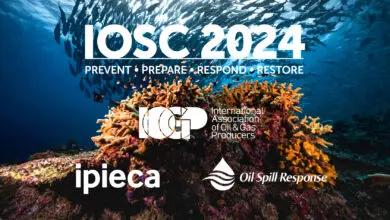
IOGP’s new strategy – driving performance and value delivery
Over the past eight months the Association conducted a comprehensive strategic review to answer key questions around the current and future format of the Association and effectiveness of its offerings, to address the expected challenges and transitions in the industry and across our Membership. On 28 July, IOGP’s Executive Director, Iman Hill, presented the first findings of the review at our virtual Members’ Meet Up.

Adapting to the magnitude of changes
Re-assessing the Association’s strategy from time to time is nothing new. However, this time was different. The world and the energy landscape are changing faster and more significantly than ever before. We are experiencing more robust challenge and stringent expectations from regulators, investors and general public on the industry to radically reduce our climate footprint and impact – from current operations, future projects and products. The industry needs to collectively improve its response, showing commitment and alignment on shared values and goals.
Tightening regulations and expected standards is driving the need for improved operational practices.
Digitalization of operations, and transformation of ways of working in general, combined with the demographics of the workforce, require a particular focus on competency and skills management for the future.
Market economics pose a potential threat to industry economics, the ability to raise finance, cost of debt and hence, operational costs, requiring further industry cost reduction and efficiency.
Finally, industry economics may hamper IOGP’s ability to increase funding to support increased scope and services; meaning a need for improved efficiency and allocation of resources to meet Members’ expectations.
The key question behind the strategic review was how IOGP ensures that the Association is aligned with its Members’ directions and continues to be relevant, delivering valuable products that improve industry performance. An important governing principle of the review was that recommendations for the future of the Association would be built on member input.
 Building on Members insights and market trends
Building on Members insights and market trends
To conduct the review, a team of Members, Leadership and Secretariat to the Strategic Review working group and Leadership Team were appointed. More than 2,100 survey requests were sent to Members, with an excellent response rate. Over 65 interviews were conducted and over 20 CEOs, EVPs, SVPs as well as many subject matter experts consulted. The group also spoke to many external stakeholders. Whether related to energy or from an entirely different industry there were many interesting insights into how these organisations are dealing with similar challenges and driving efficiencies in their operations.
Members confirmed that IOGP is a highly relevant industry association. It is differentiated in the market by its international breadth, level of influence, and its predominantly upstream E&P operator member focus. It is valued for the key roles it performs in building Member consensus and alignment around industry issues and standards; in driving the adoption of industry HSE and engineering best practices; and in advocating for the industry on key issues with national governments and regulators. Members also acknowledged that IOGP has developed a strong reputation for the quality of the work it delivers and for the expertise of its Secretariat staff and Committee representatives. The majority of the Membership see IOGP as providing a good to very good service to the industry, with technical work programmes and advocacy efforts aligned to Member needs.
However, there have also been a couple of clear expectations shared around opportunities for improvement in work planning and prioritization:
- Climate change and the energy transition is on top of the agenda
- Members want IOGP to stand up and speak for our industry more and further extend the excellent advocacy work we have been doing more broadly globally.
- Members are looking to the Association to help retain and attract the talents our industry needs
- Engineering standardization and innovation are essential to drive efficiency and lower cost, and
- Prevention of major incidents through use of industry best practices in Health, Safety and Environment is critical to ensure our license to operate.
From scenarios to a new purpose
Throughout the review five incremental IOGP scope and remit scenarios were developed, covering the full range of Member potential future needs. Each of the scenarios was assessed for its benefits, opportunities, challenges, and risks as well as the implications and changes required to IOGP’s operating model.
Following this comprehensive analysis, it was concluded that the preferred scenario maintains IOGP’s primary focus on the upstream but positions IOGP to lead the climate change and decarbonization agenda extending discipline coverage into E&P decarbonization themes such as flaring and venting, GHG measurement and reporting, energy efficiency, electrification, CCS and blue hydrogen.
It also incorporates broader topics such as standardization and digitalization, and industry skills and competency management.
It requires IOGP to extend its advocacy remit globally, representing primarily the E&P sector, but where relevant the wider oil and gas industry.
Finally, it requires extension of the current E&P Membership to increase the level of IOGP’s industry representation and hence, voice and influence of the sector.
Building on this, a new purpose statement was developed:
“This is what we stand for,” said Iman Hill.
The three pillars of IOGP’s future service
What does the new purpose mean practically? IOGP’s future service will be built on three pillars:
- Building on strong foundations:
The Association is building on its heritage of HSSE, engineering and advocacy. Among others, this includes to continue to drive engineering standards and technical good practice as well as digital solutions. The Association’s advocacy efforts will step up and be more global. Agility and foresight is on top of the agenda as well – to respond to stakeholder queries.
- Engineering through the Energy Transition
Throughout the strategic review IOGP’s role in the Energy Transition has been one of the core questions. “We believe, not only that we have to set up our Association to be able to react to change, to adjust and to find our way around society’s expectations. We need to and we must be part of the change, driving it, leading it. And, as IOGP, we want to support our Members in doing so”, said Iman.
IOGP will therefore accelerate decarbonization solutions and facilitate industry alignment on emissions. Prioritized themes and opportunities for the industry have been identified as: Carbon Capture & Storage, Electrification, Energy Efficiency and Flares & vents.
The Association aims to drive widespread implementation of technologies to reduce greenhouse gases across these four themes for existing and new offshore and onshore oil and gas facilities through shared knowledge, expertise and standards. You will find detailed information in our new Low Carbon brochure.
Another key work stream will be the continued industry wide collaboration to promote the Workforce of the Future.
- Leading through agility, vision, and collaboration
IOGP will have a much more pro-active foresight-based approach to ensure that the Association identifies emerging risks, enhances regional coordination and ensures alignment on response, policy and positioning. Agility, increased co-ordination and integration between the committees as well as cross-association alignment will be critical to ensure that the service IOGP provides meets its Members’ expectations on efficiency and value.
A new operating model
An essential part of the strategic review was an assessment of the changes required to IOGP’s organization structure, resourcing and operational ways of working to enable IOGP to deliver on its future strategy, address Member feedback on areas for improvement and enable IOGP to respond and flex in line with potential future industry change.
Changes include the implementation of a refocused Strategy & Planning Directorate that will identify emerging industry trends and challenges. Where new work priorities are identified this pillar will incubate short term, agile IOGP “task forces”, leveraging existing IOGP technical and/or policy expertise, to scope and framework requirements and solutions, and plan how solutions should best be delivered, including how IOGP should collaborate with other industry Associations or bodies.
To deliver on the Low Carbon work program, a dedicated Energy Transition Directorate will be created and led by a recently appointed Energy Transition Director, Concetto Fischetti, starting 1 September seconded from Eni. You will learn more about Concetto in the September edition of Pulse.
“I’m very proud of the robustness of the work that we’ve collectively done to deliver the new strategy. Our way forward is founded on the voice and views of our Members, and I truly believe that we have set up IOGP to be a driving force for the industry. I am looking forward to delivering on the new strategy together with all the Members SMEs but also with a Secretariat that is one of the most dedicated, passionate, knowledgeable group of experts I ever had the privilege of working with”, Iman concluded.




